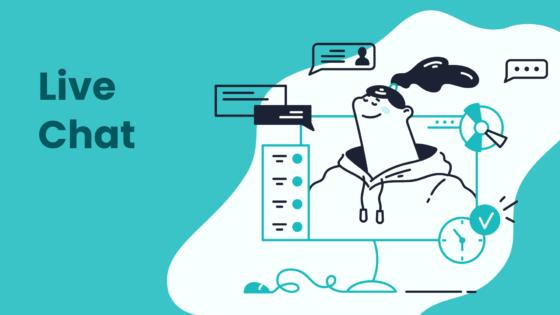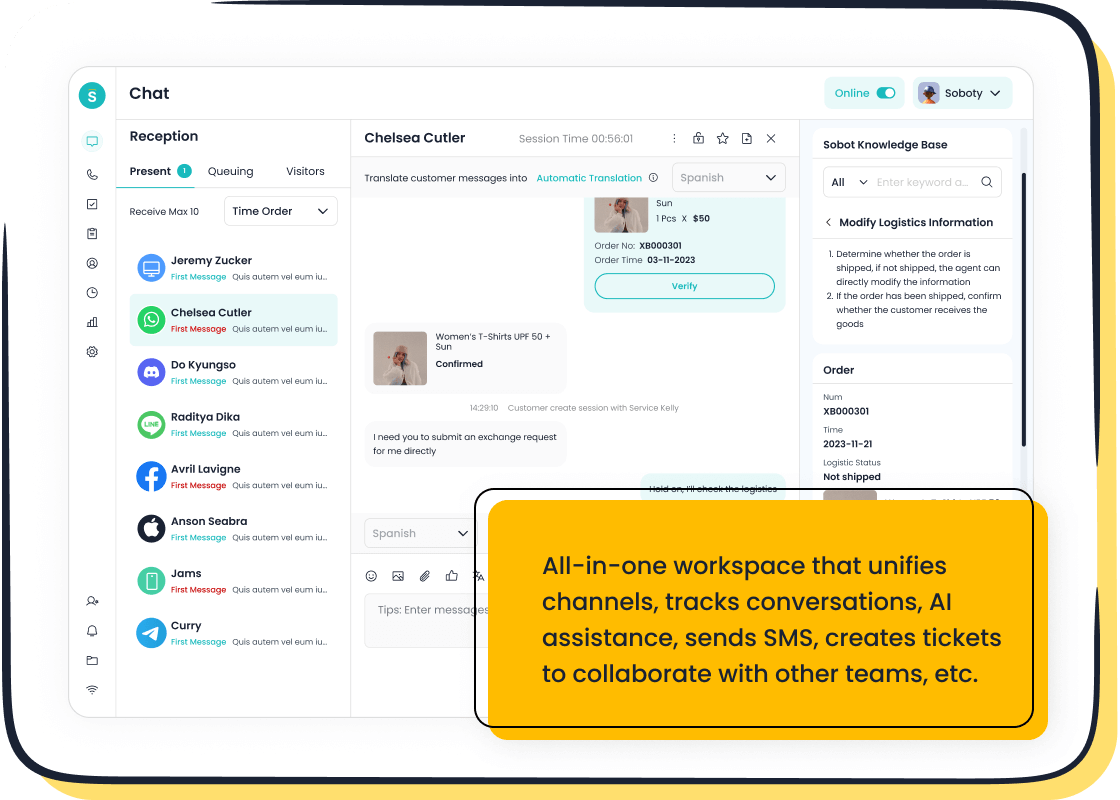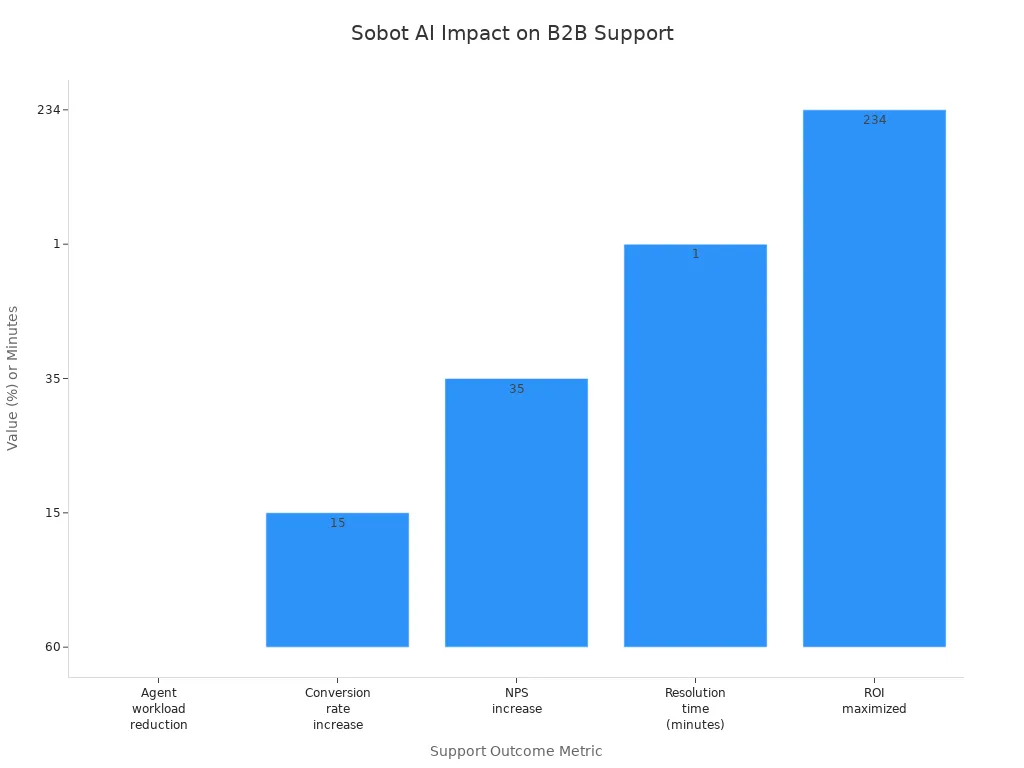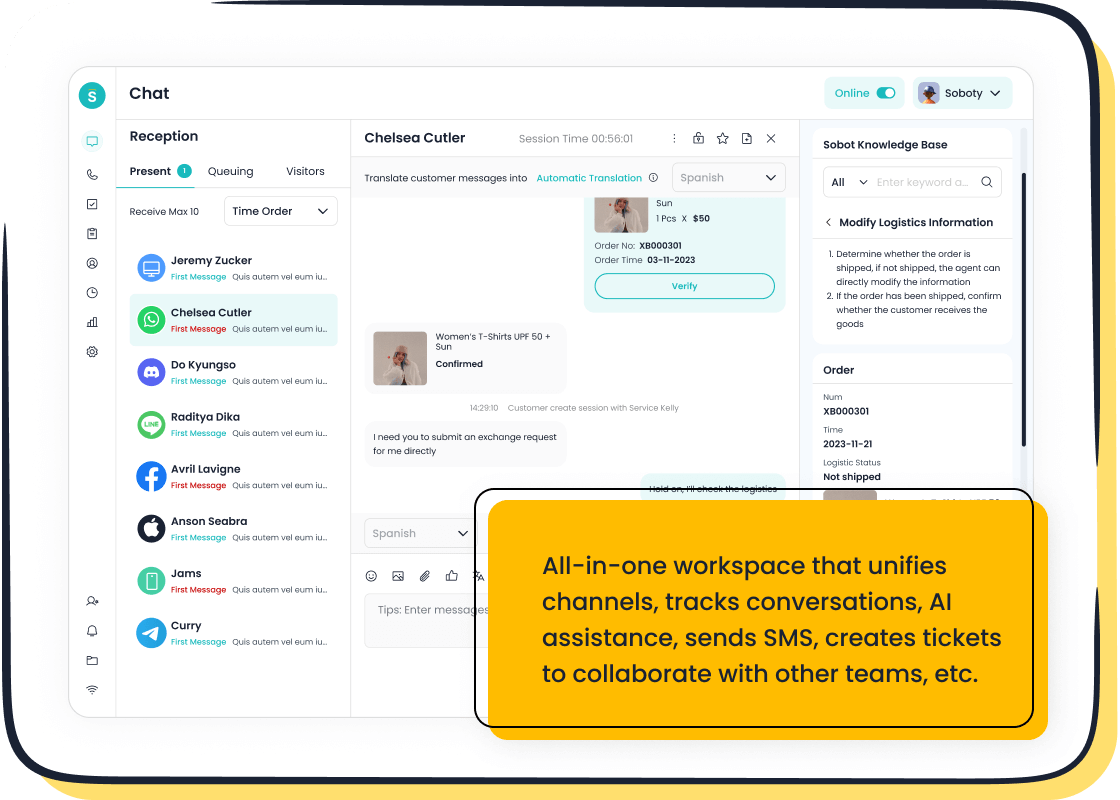What Makes B2B Customer Support Unique Versus B2C

B2B customer support stands apart due to its focus on relationship-driven service, longer buying cycles, and the need to address multiple stakeholders. Companies see a 25% increase in sales productivity and a 30% reduction in sales cycles when using AI-powered contact enrichment. B2B support depends on trust and customization, while B2C customer support centers on quick, efficient solutions. Businesses like Sobot use Sobot AI and the Sobot call center to deliver personalized customer support that builds loyalty and drives growth.
B2B vs. B2C Customer Support
B2B Customer Support Defined
B2B customer support refers to the assistance that businesses provide to other businesses throughout the sales and service journey. This type of support covers product setup, training, account management, and issue resolution. B2B customer service often involves multiple stakeholders and longer resolution times. Businesses expect high levels of expertise and personalized attention because their operations depend on reliable products and services. Building trust and strong relationships is essential. Companies like Sobot help businesses manage these complex needs by offering advanced tools such as omnichannel support and AI-powered chatbots, which streamline communication and improve efficiency.
B2C Customer Support Defined
B2C customer support focuses on helping individual consumers with their purchases and service needs. This support is usually fast and transactional, aiming to resolve issues quickly. B2C customer service uses digital channels like live chat, email, and mobile apps to reach customers wherever they are. Self-service options, such as knowledge bases and help portals, allow consumers to find answers on their own. B2C marketing often relies on emotional content and quick responses to build loyalty. Businesses in the business-to-consumer space must handle large volumes of requests and provide consistent, high-quality service to keep customers satisfied.
Key Characteristics
The main differences between B2B and B2C customer support can be seen in their expectations, processes, and relationship-building approaches.
| Aspect | B2B Customer Expectations and Characteristics | B2C Customer Expectations and Characteristics |
|---|---|---|
| Decision-Making Process | Logical, data-driven, involves multiple stakeholders, requires approval, focuses on ROI and long-term benefits | Emotional, influenced by immediate needs and desires, quick decisions with minimal deliberation |
| Customer Journey Length | Longer, complex, involves consultations, demos, and evaluations | Shorter, faster, often completed in a single session |
| Relationship Building | Built over time with ongoing support, training, account management, trust and reliability emphasized | Built through personalized marketing, loyalty programs, and responsive support |
| Purchase Complexity & Size | Higher cost, customized solutions, negotiated contracts, longer onboarding | Lower cost, simpler transactions, frictionless purchase experience |
| Content Role | Detailed content like white papers, case studies, product comparisons to educate and build trust | Emotional content such as videos, reviews, and social proof to capture attention quickly |
| Customer Support Journey | Includes ongoing training, account management, focus on long-term ROI and retention | Focus on immediate issue resolution, satisfaction, and loyalty-building efforts |
| Real-Time Interaction Expectation | 80% expect real-time interaction | 64% expect no delay |
| Understanding Unique Needs | 89% expect companies to understand their unique needs | 72% expect companies to understand their unique needs |
B2B customer support often requires clear communication, technical expertise, and ongoing engagement. B2C customer support, on the other hand, emphasizes speed, convenience, and self-service. B2B marketing strategies focus on building trust and long-term value, while B2C marketing highlights quick satisfaction and emotional appeal. Businesses that understand these differences can tailor their customer service and support strategies for better results. Sobot’s solutions help both B2B and B2C organizations meet these unique needs by providing unified, AI-driven customer support platforms.
Main Differences in Customer Support
Complexity and Stakeholders
B2b customer support stands out for its complexity. Businesses that serve other businesses face longer sales cycles and larger order values. Decision-making in b2b customer service involves many steps and several people. A company may have users, managers, procurement teams, and technical experts all involved in one purchase. Each stakeholder has unique needs and concerns. For example, technical users want product specifications and integration details, while managers focus on return on investment.
B2b customer support must address these different perspectives. The process often includes negotiation, customization, and approval stages. B2b sales cycles can last from one month to over a year. This is very different from b2c, where a single consumer makes quick decisions based on price or convenience.
B2b customer service teams need to coordinate with multiple contacts from the same company. They track service history and provide updates to everyone involved. B2c support usually helps one end-user at a time, making the process simpler.
Here is a table that highlights the differences in stakeholders between b2b and b2c customer support:
| Aspect | B2B Customer Support | B2C Customer Support |
|---|---|---|
| Number of Stakeholders | Multiple stakeholders including sales reps, technical support, upper management, and various teams | Usually a single end-user |
| Roles of Stakeholders | Coordination among sales, technical, and management teams; proactive and scheduled engagement | Primarily customer service reps handling straightforward issues |
| Decision-Making Process | Longer, involving several stakeholders and multiple approval stages | Shorter, often transactional with fewer decision-makers |
| Customization Expectation | High; tailored solutions, dedicated support personnel, scheduled calls, and ongoing updates | Limited; generic troubleshooting, ticket submission with standard response times |
| Interaction Nature | Complex, multi-layered communication and coordination | Simple, direct, and reactive interactions |
B2b customer support must manage service for b2b clients across many touchpoints. Businesses rely on unified platforms like Sobot’s omnichannel solution to keep all communication organized. Sobot helps agents track conversations, automate workflows, and provide consistent updates to every stakeholder. This level of coordination is essential for b2b customer service success.
- B2b transactions involve larger order values and longer, more complex decision-making processes with multiple stakeholders.
- B2b customers are professionals or decision-makers requiring trust, consistent quality, and ongoing support.
- B2b sales cycles often take 1-3 months or longer, with negotiation and customization involved.
- B2c purchase decisions are quicker, simpler, and often impulse-driven, made by individual consumers based on price, convenience, and personal taste.
- B2b buying decisions are group-based, focusing on specific pain points relevant to each prospect and decision-maker.
- B2c sales cycles are shorter, with decisions typically made by a single individual based on more generic needs.
- B2b involves collaboration and partnerships to customize solutions, whereas b2c customers expect off-the-shelf products without deep customization or consultation.
- B2b purchases involve multiple stakeholders at different company levels (users, choosers, managers, procurement teams), leading to longer and more collaborative decision cycles.
- Content and support must address both technical users and decision-makers, reflecting their distinct concerns such as product specifications, ROI, and integration.
- Pricing in b2b is often customized and negotiated, unlike the straightforward pricing in b2c.
- The b2b sales cycle is longer, often lasting months to over a year, involving extensive research, justification, and approval steps.
- B2b customer journeys emphasize relationship building, trust, and ongoing support, contrasting with the more transactional and impulse-driven nature of b2c.
Relationship and Engagement
B2b customer support focuses on building strong relationships. Businesses want long-term partnerships, not just one-time transactions. B2b customer service teams use regular follow-ups, tailored solutions, and proactive problem-solving to keep b2b clients satisfied. Trust and transparency are key. Companies that communicate clearly and adapt to changes build loyalty and reduce risks for their customers.
A study by Mower found that b2b relationships depend on three pillars: trust, relevance, and affection. Decision-makers are 2.6 times more likely to recommend a trusted brand. They are 3.8 times more likely to buy again from a company they trust. Relevance, or how well a brand meets client needs, doubles the chance of repeat purchases. Affection, or emotional connection, makes decision-makers three times more willing to pay higher prices and 4.1 times more likely to see the company as a true partner.
B2b customer engagement is complex. It often involves meetings, phone calls, and detailed emails. B2b buyers expect personalized solutions and high-touch interactions. In fact, 63% of b2b purchases involve more than four decision-makers. Engagement must address each person’s concerns and provide value to the whole team.
B2c customer engagement is simpler. Companies focus on emotional connections and quick support. B2c buyers want connected experiences across email, websites, apps, and social media. Support is short-term and often ends after the issue is resolved. B2c surveys use incentives like discounts or gift cards to encourage feedback. B2b surveys offer reports, demos, or exclusive deals that help businesses grow.
B2b customer support requires more time, effort, and collaboration than b2c. Businesses use platforms like Sobot Live Chat to personalize engagement and keep all conversations in one place. Sobot’s AI-powered tools help agents respond quickly and provide relevant information to every stakeholder.
- B2c customer engagement is generally less complex, focusing on emotional, value-based relationships with individual buyers who have full buying power.
- B2c buyers prefer connected, omnichannel experiences across platforms like email, websites, apps, and social media, with short-term support focus.
- B2b engagement involves complex relationships with multiple stakeholders and longer sales cycles, sometimes over a year.
- B2b buyers expect personalized, turnkey solutions and prefer high-touch interactions such as phone calls and meetings.
- 63% of b2b purchases involve more than four decision-makers, making engagement multifaceted.
- Omnichannel experiences are important in both, but b2b focuses more on collaborative channels like video calls.
- B2b respondents tend to be more rational and sophisticated, with incentives tailored to business benefits rather than individual rewards.
- Overall, b2b engagement requires more time, effort, and personalized collaboration compared to the broader, emotionally driven b2c engagement.
Urgency and Impact
Urgency in b2b customer support is much higher than in b2c. Businesses depend on products and services to run their operations. When something goes wrong, the impact can be huge. B2b customer service teams must respond quickly to critical issues. Many companies use formal Service Level Agreements (SLAs) to guarantee fast response times. For example, a b2b client may require a two-hour response for urgent problems.
B2b issues often affect many people and can disrupt entire organizations. Support teams may need to coordinate with technical experts, managers, and even CTOs to solve complex problems. Poor b2b customer service can damage a company’s reputation and lead to lost clients. Retaining a b2b customer is five times cheaper than finding a new one. Good customer support leads to higher retention, renewals, and business growth.
B2c customer support focuses on quick resolution and satisfaction scores. Problems usually affect only one person. Companies use chat, social media, and email to provide fast help. The impact of poor service is more spread out and less likely to hurt the business as much as in b2b.
62% of b2b customers buy more after a good customer service experience, compared to 42% in b2c. In b2b, 80% of buying decisions depend on customer experience, while only 20% depend on price or product.
B2b customer support uses formal communication channels like scheduled calls, detailed emails, and on-site visits. B2c support is less formal and relies on instant messaging. Businesses use platforms like Sobot’s omnichannel solution to manage urgent issues and keep communication clear. Sobot’s AI and automation features help agents respond faster and track every interaction, ensuring high customer satisfaction.
- B2b support involves formal Service Level Agreements (SLAs) with guaranteed response times (e.g., 2-hour response for critical issues), unlike b2c which typically lacks formal guarantees.
- B2b issues are more complex, often requiring coordination with multiple teams and higher-level contacts (e.g., CTO involvement during outages affecting thousands of end users), demonstrating higher urgency.
- B2b customer relationships are long-term and high-value, with success measured by client retention, renewals, and business impact, contrasting with b2c’s focus on quick resolution and customer satisfaction scores.
- Communication in b2b is more formal and multi-channel (scheduled calls, detailed emails, on-site visits), while b2c relies on faster, less formal channels like chat and social media.
- Poor b2b service risks damaging reputation within tight industry networks, potentially losing multiple clients, whereas b2c impact is more dispersed.
Tip: Businesses that invest in advanced customer support platforms like Sobot can improve response times, reduce costs, and increase customer satisfaction. Sobot’s unified workspace and AI-powered tools help agents manage urgent issues and keep b2b clients happy.
Technology in B2B Customer Support

Omnichannel Solutions
B2b customer service has changed quickly because of new technology. Today, most support leaders focus on digital-first strategies. They use omnichannel solutions to help customers across email, social media, websites, and messaging apps. Studies show that 74% of sellers invest in these platforms to meet buyer expectations. Omnichannel support lets b2b companies share data between channels. This helps agents understand customer needs and personalize service. Customers can choose their favorite way to connect, which increases satisfaction and loyalty. Companies also get a full view of each buyer, making it easier to guide them through complex journeys. When businesses use integrated platforms, they improve efficiency and reduce frustration. These solutions help b2b customer support teams keep messages consistent and respond faster.
Omnichannel strategies make b2b customer service more effective by aligning with modern buyer expectations and supporting every step of the journey.
- Consistent messaging across channels
- Personalized interactions using shared data
- Higher customer retention and revenue
- Reduced frustration and loss to competitors

Sobot Live Chat for B2B
Sobot Live Chat gives b2b customer service teams powerful tools to manage complex support needs. The platform supports chatbots, live chat, voice, ticketing, and WhatsApp Business API. Sobot’s intelligent chatbots handle routine questions and keep response times fast, even during busy periods. The system auto-assigns chats to the right department, so salespeople only join when needed. Trained agents direct conversations and engage visitors on high-intent pages. Sobot uses enriched customer data to personalize greetings and qualify leads quickly. These features help b2b companies shorten sales cycles and scale support.
Sobot’s AI, automation, and analytics improve b2b customer support outcomes. Automated workflows reduce agent workload by 60%. AI Copilot boosts efficiency and increases ROI. The platform offers over 300 statistical reports for proactive outreach and quality checks. Resolution times often drop below one minute with AI and human collaboration. Sobot integrates easily with existing systems, making it flexible and secure for any business.

B2b customer support now relies on technology to deliver fast, personalized, and reliable service. Sobot’s solutions help businesses meet these demands and improve customer satisfaction.
Real-World B2B Support: Sobot Case Study

Agilent’s Success Story
Agilent, a global leader in life sciences and diagnostics, faced challenges common in the b2b world. The company needed to handle a high volume of complex inquiries from business clients. Each b2b customer expected fast, accurate answers and ongoing support. Agilent chose Sobot to improve its customer service operations. Sobot provided an omnichannel platform and an AI-powered chatbot. These tools helped Agilent manage requests from multiple channels and deliver consistent service.
Sobot’s platform allowed Agilent to automate routine questions. Human agents could then focus on more complex b2b issues. The system also unified all customer interactions in one workspace. This made it easier for agents to track conversations and provide timely updates. Agilent’s team used Sobot’s analytics to monitor performance and spot trends. The company could respond quickly to changes in customer behavior. This proactive approach helped Agilent build stronger b2b relationships and improve retention.
Sobot’s AI-driven solutions support b2b companies by streamlining workflows and enabling agents to deliver personalized service. These features help businesses like Agilent meet the high expectations of their b2b customers.
Measurable Results
Agilent saw clear, measurable improvements after adopting Sobot’s solutions. The company tracked key metrics to understand the impact on b2b customer support. The table below shows the main results:
| Metric | Result |
|---|---|
| Service Efficiency | Increased sixfold |
| Cost Reduction | 25% decrease |
| Customer Satisfaction | 95% satisfaction score |
These numbers show that Sobot’s platform made a real difference. Agilent improved efficiency and reduced costs. The high satisfaction score proves that b2b customers valued the changes. Other b2b companies using Sobot have also seen benefits:
- Up to a 25% increase in Customer Lifetime Value by identifying high-value segments.
- Accurate forecasting of churn and future value with AI-powered analytics.
- Real-time alerts that help teams respond quickly to customer needs.
- Seamless integration with CRM systems for large b2b enterprises.
Sobot’s solutions help b2b organizations boost engagement, retention, and overall customer satisfaction. Companies can scale support, personalize service, and achieve better business outcomes.
Why B2B and B2C Support Differences Matter
Business Impact
Recognizing the differences between B2B and B2C customer support shapes how businesses allocate resources and design their service strategies. B2B support teams manage fewer accounts, but each customer represents high value and complex needs. B2C teams handle large volumes of customers, each with lower individual value, so they rely on scalable solutions and automation. The table below highlights how these differences affect business outcomes:
| Aspect | B2B Customer Support Characteristics | B2C Customer Support Characteristics | Business Impact |
|---|---|---|---|
| Customer Volume & Value | Small number of high-value accounts | Large number of customers with lower individual value | Enables tailored resource allocation: personalized service for fewer clients vs. scalable solutions for many |
| Consulting Intensity | Active, in-depth, personalized consulting | Focus on efficient handling of large volumes, extensive self-service | Drives need for specialized consulting staff in B2B and automated/self-service tools in B2C |
| Individualization | High level of individual profiling and rapid escalation management | Limited individual profiling, focus on brand image and public perception | Prevents costly failures in B2B; maintains customer satisfaction and brand reputation in B2C |
| Technology & Personnel | Less emphasis on multichannel; focus on complex, personalized communication | Critical use of omnichannel/multichannel strategies and fast ticket processing | Influences technology investments and training: complex CRM for B2B vs. scalable multichannel platforms for B2C |
| Process Management | Managing fewer, complex tickets with holistic customer data views | Managing large ticket volumes efficiently across channels | Improves operational efficiency, customer retention, and profitability in both sectors |
Sobot’s omnichannel solutions help businesses manage these differences. For example, Sobot Live Chat enables agents to personalize service for B2B clients and scale support for B2C customers. Companies that understand these distinctions improve operational efficiency and customer retention.
Customer Experience
Customer experience changes when businesses tailor support to B2B or B2C needs. B2B customers expect personalized, human-centric interactions that solve complex problems. B2C customers want fast, convenient solutions and self-service options. Sobot’s AI-powered tools and unified workspace allow agents to deliver friction-free experiences for both groups.
Companies that invest in tailored support see higher Net Promoter Scores (NPS), Customer Satisfaction (CSAT), and Customer Effort Scores (CES). Customers are 3.5 times more likely to buy again after a great experience, while poor service can lead to a 9.5% loss in revenue (source).
- B2B customer experience benefits from personalization and real-time insights.
- B2C marketing relies on omnichannel support and efficient ticket processing.
- Digital innovation and self-service options empower customers and reduce effort.
- Breaking down silos and analyzing feedback helps businesses refine strategies.
- Customers are more likely to recommend and trust brands that deliver satisfying experiences.
Sobot’s platform supports both B2B and B2C marketing goals by providing tools for personalized engagement and scalable support. Businesses that use these solutions build stronger relationships and improve customer loyalty.
Best Practices for B2B Customer Support
Building Relationships
Strong relationships form the foundation of b2b customer service. Companies that want to deliver exceptional service must focus on trust and long-term value. Teams can build trust by establishing clear Service Level Agreements (SLAs) that set expectations for response times and support quality. Many organizations use technology like AI automation and CRM systems to personalize every interaction. Customer service agents who understand industry regulations and client needs provide more relevant support. Regular, consistent communication helps maintain strong connections. Companies also benefit from collecting feedback and acting on it to improve customer service. Treating b2b clients as partners, not just customers, leads to better collaboration and loyalty.
Tip: Fast, multi-channel support and proactive outreach, such as contract renewal reminders, show clients that their business matters.
Customization and Integration
Customization and integration play a key role in b2b customer service. Modern platforms automate manual tasks, reduce errors, and connect systems like CRM, ERP, and payment solutions. This streamlines operations and allows teams to respond quickly to customer needs. Industry benchmarks highlight the value of using unified integration platforms and standardizing data formats. Security remains a top priority, so companies use encryption and secure protocols. Training staff and partners ensures everyone can use new tools effectively. Scalable solutions help businesses grow without losing efficiency. Analytics and reporting allow teams to monitor and optimize every process.
- Automation reduces manual work and errors.
- Integration connects all business systems for seamless service.
- Security features protect sensitive data and ensure compliance.
Leveraging Sobot Solutions
Sobot offers powerful tools for b2b customer service. The Sobot Live Chat platform supports omnichannel communication, so agents can help customers on websites, apps, and social media. AI-powered chatbots handle routine questions, freeing agents to solve complex issues. Sobot’s unified workspace brings all customer data together, making it easy to personalize support. Built-in analytics help teams track performance and improve service quality. Companies using Sobot see faster response times, higher satisfaction scores, and better retention. Sobot’s solutions support b2b marketing by enabling targeted engagement and efficient support across every channel.
Recent research shows that b2b customer support involves longer, more complex buying journeys and deeper relationships than B2C support. The table below highlights these differences:
| Feature | B2B Customer Support | B2C Customer Support |
|---|---|---|
| Journey Length | Long, multi-stage | Short, impulsive |
| Relationship | Personalized, trust-based | Transactional, loyalty-based |
Business leaders and support teams benefit from understanding these differences. Sobot uses AI-powered tools to automate tasks, provide 24/7 support, and improve customer satisfaction. Companies using Sobot see faster response times and higher CSAT scores. Adopting advanced technology helps teams deliver better service and build lasting partnerships.
FAQ
What makes B2B customer support more complex than B2C support?
B2B customer support often involves multiple decision-makers and longer sales cycles. Each business client may need custom solutions and ongoing training. In contrast, b2c support usually helps individual buyers with quick answers. Sobot’s omnichannel platform helps manage these complex B2B relationships.
How does Sobot improve customer support for B2B companies?
Sobot provides tools like Live Chat, AI-powered chatbots, and a unified workspace. These features help agents respond faster and keep all customer data in one place. Companies like Agilent saw a sixfold increase in efficiency after using Sobot’s solutions.
Why do B2B and B2C customers expect different support experiences?
B2B customers want personalized service, regular updates, and clear communication. Their purchases affect entire teams or departments. B2c customers look for fast, easy solutions. They often use self-service options. Sobot’s platform supports both by offering omnichannel support and automation.
Can Sobot’s solutions help with both B2B and B2C customer support?
Yes. Sobot’s omnichannel and AI-driven tools work for both B2B and b2c companies. Businesses can manage complex B2B cases and handle high volumes of b2c requests. This flexibility helps companies improve customer satisfaction and retention.
What are the main benefits of using omnichannel support in B2B and B2C?
Omnichannel support lets customers reach businesses through their favorite channels, like chat, email, or social media. This approach increases satisfaction and loyalty. Sobot’s omnichannel solution helps companies deliver consistent service, whether they serve B2B or b2c customers.
See Also
Enhance SaaS Customer Support Using Effective Live Chat
How AI-Powered Agents Are Transforming Customer Support
Comparing The Leading Voice Of Customer Software Solutions
